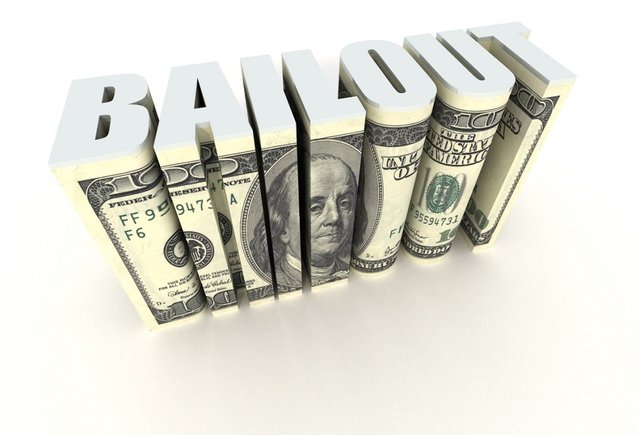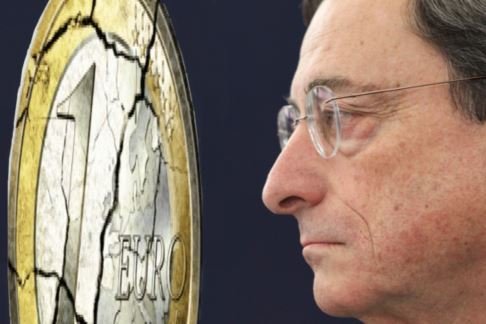Global Contagion of Bank Failures Coming…
The short-dollar carry trade tidalwave inversion vortex I wrote about in the Footnotes of my Get Ready for a World Currency blog is well underway— which contrary to popular beliefs will temporarily drive the USD dollar and the USA stock markets sky high while the rest of the world collapses into economic recession (and in Europe likely a Great Depression).

The Dollar – The Greatest Short Position Perhaps in History
This vortex and its timing was also discussed in the context of the recent DJIA/Bitcoin crash in my recent blog POSSIBLE SLINGSHOT BITCOIN CRASH AHEAD. This has also been discussed by myself especially in the Martin Armstrong thread under my numerous pseudonyms including the last CRED.me discussing why the global crisis is necessary and the role Bitcoin may play.
2019 - 2021 are likely to be very bad years for all countries except the USA. And after 2021, the USA is likely to also begin to politically and economically self-destruct (aka ideological suicide). Asia is likely to bottom 2020ish and begin climbing up while Europe falls into the economic and political abyss. Note there’s a bit of uncertainty on that timing, as we’re still observing to determine if the dollar and DJIA decline into a low for 2020, delaying and extending the short-dollar vortex, but I’m leaning towards that not being as likely an outcome.

I’m copying three recent Armstrong blogs here as follows to make sure his messages attains more exposure. I’m refusing any payouts (implying that you can upvote without diminishing/consuming your voting power) on this blog because this is being done as a public service.
Here’s the first one:
The Coming Banking Crisis & The End of Bailouts
Posted Feb 21, 2018 by Martin Armstrong
Behind the curtain, there is a growing concern about a serious banking crisis beginning once again in Europe. Many governments are talking about the crisis behind-the-curtain and we are now beginning to see steps that are being taken to end the TO-BIG-TO-FAIL policies that dominated the 2007-2009 Crash.
The United States is looking at a new radical bank rescue policy where the government is proposing to revise a central pillar of the idea of bailing out banks creating new financial regulation with a new Chapter 14 bankruptcy procedure. They are looking at eliminating the risk of taxpayers’ costs to bail out banks. They are investigating the means for an orderly resolution so that the taxpayers do not have to bail out the banks. This development is causing some concern among the high-flying Wall Street banks, for if that is the case, then another crisis as 2007-2009 will result in even Goldman Sachs closing. The proposal looks to shift the burden to the shareholders and creditors of that bank. This means depositors who are thus creditors.
In Australia, we see similar legislation being proposed. This is the Financial Sector Legislation Amendment (Crisis Resolution Powers and Other Measures) Bill 2017. This also authorizes bail-ins bringing an end to the bailout.
And here’s the second one:
Rising Interest Rates
Posted Feb 22, 2018 by Martin Armstrong
While the stock market crashed as the pundit looked in their bag to try to come up with an excuse, they blamed rising inflation and interest rates. Yet, nobody is really paying attention to the underlying trend. The cost of carrying debt has been rising gradually and there are noticeable measurable impacts that the pundits are of course oblivious to since they have to explain every day’s movements and not the real trend.
Already, the 10-year rate is piercing above the 2.6% area. There is an impact on the currency once people begin to comprehend the trend. The 10-year German bond rate is 0.70%, and this has been maintained by the ECB buying 40% of European government debt to no avail for nearly 10 years.
The real crisis comes when they realize that the ECB will not be there to buy government debt. The bidders will demand a higher yield so rates will rise very rapidly.
Meanwhile, the Fed will pursue higher interest rates as they need to be normalized to help pensions funds that are rapidly collapsing. This idea of a lower dollar will raise the price of imports and with tariffs, inflation in consumer products will rise.
Mueller is still not ending his investigation [he’s on a politically motivated witch hunt]. Why should he? He would have to go get a real job in the private sector. Keep the investigation alive to pay the light bills. He shows no sign of embracing unemployment. His pretend indictment is dancing between raindrops, indicting people in Russia knowingly there will never be a trial. We cannot count him out yet as a factor that will undermine the economic confidence.
So we stand at the threshold of rising rates that will then feed into the market and create a bid for the dollar it appears after March.
Here’s the third one:
India Enters the Sovereign Debt Crisis
Posted Feb 22, 2018 by Martin Armstrong
I have warned continually that the Sovereign Debt Crisis will unfold not so much by people selling government debt, but by the lack of people buying new debt. The greatest peril is when there is NO BID for the new issues because all governments are operating a PONZI scheme. The sell new debt to pay off maturing debt. Currently, holders of Indian government debt have been dumping 4.7 billion rupees ($73 million) of government bonds on average every day this year, according to data from the Clearing Corp. of India. Last year, their net daily sales totaled 368 million rupees.
The Sovereign Debt Crisis emerges when the government is unable to raise enough cash to pay off the maturing debt. India has crossed that threshold so as we have warned, the Sovereign Debt Crisis will begin from outside the USA and spread to the core. This is how all Empires, nations, and city-states collapse.




I recall you writing on BCT around 2015 of 2018 being "the year"; at least there or thereabouts. Do you think a warning sign of imminency (if Europe turns out to be the first domino to fall), would likely be the failure of, say, an Italian bank?
I still get responses of disbelief amongst work colleagues etc if I mention that we don't own our bank deposits. A combination of blind faith (even after 2008!) and blissful ignorance to a reality which could undermine their whole financial lives. I believe legislation was brought in here in the UK around a year ago to more easily facilitate bail-ins. You never get this kind of thing mentioned in mainstream media business reports, which generally maintain the up-beat fallacy that everything is ticking along nicely.
When this hits in Europe, I can see us all living like the Greeks are now, if not like Venezuelans! If it does pan out this way, it will undermine the trust millions take for granted in the long-civilised continent.
Btw, any opinion on the Petro (PTR)?
Lativa Banking Crisis Unfolding on Schedule – Will May Be a European Contagion?
How the Euro Will Be Killed by Politicians
My available time doesn’t enable me to study in sufficient detail to give any informed response about which specific catalyst might likely be the trigger of the approaching contagion. I suggest monitoring Armstrong’s blogs for that as he as for example in the past mentioned the failure of some bank in Austria as kicking off the contagion that ultimately lead to the Great Depression. He has reiterated numerous times in his blogs that “a stiff wind” could blow over the European banks at any time. He has explained that unlike in the USA, Draghi didn’t recapitalize the EU banks (which are still leveraged something ridiculous like 40-to-1 ratio of loans to liquid assets), instead he only bought the sovereign debt of the EU member nations kicking the can down the road but leaving the banks with $trillion of ill-fated loans on the books (will become NPLs when the ECB stops buying the sovereign debt and the contagion is unleashed). As interest rates are rising, the pressure cooker of the unavoidable Minsky Moment moves closer to BIG BANG with the chaos of the mess blown all over the kitchen. Then they have the millions of rapefugees already inside of Europe, who in an economic downturn are likely resort to amplified thuggery. Americans are resisting the immigration of those who don’t adhere to our civic religion or for example the right to gun ownership to guard against a return of the injustices at the formative period of our nation.
I suggest making a common sense argument to your colleagues comparing the stagflation of the 1970s to the fundamentals of the situation today. Maybe that will penetrate their cranium.
W.r.t. Petro which is Venezuela’s cryptocurrency, it defies the entire point of decentralized ledgers which is to not require dependence on any third party. Who will enforce the contract that a token is redeemable for a physical resource? However, maybe there’s something deeper going on. Maybe it’s about being able to avoid sanctions and sell of their assets to the Chinese and then let China come in an take over their country to rebuild it? A partnership with another communist State oriented around copying the move towards capitalism? So is this the shift of Venezuela away from Communism as China did while nobody really realized they had totally changed to capitalism? Is this how change occurs less violently with decentralized ledgers than the prior means of physical coup d’etats?
EDIT: someone read my comment above and sent me this:
Thanks for taking time to reply; I realise you're hard at it with your project.
Cheers for the "stagflation argument" link. There is maybe one person at work who might "get it" in our next kitchen conversation.
Generally though, I believe that most people will need too much time (or a nasty financial shock) to adjust their thinking (and media programming) to see the advantages of a decentralised trustless system over generations of centralised structures (new products and innovations by big brands seem to generally hold more credence with the public than those by startups). There again, I too am one of those ordinary people (with no financial or STEM background), it's just that I managed to recalibrate my thinking a few years back. Though this was due to actively seeking answers at the time. I think we generally need to sense first that something is wrong and then search for a solution, and attempt to break free from conditioning. Most people are reluctant to think critically and therefore stick to long held myths and ideologies, persisting with them even in the face of compelling new information. So what I'm saying is that any step change needs to be as seemless as possible, that it happens without them realising it; that they are suddenly adopting new habits because of convenience, "coolness", and peer pressure. That they could be using decentralised ledgers every day and not know what they are (and not care), just like they don't really understand how their computer or the internet works now.
I've been reading Armstrong's blog just about every day for the last 3 - 4 years, but sometimes it needs different perspectives and a much deeper knowledge than my own to properly understand the points he is trying to make.
Re what you said about the Petro (I too had also read about the gold-backed Petro Gold token - which creates an even more furrowed brow of concern), and am somewhat ambivalent as to what motives are behind its creation and if there will be sound implementation. I guess we'll just have to wait and see. It could as you say, be a move like China's (another example of Armstrong's Public to Private), in their move to a unique hybrid of Capitalism by sleight of hand. Maybe against all odds Venezuela can pull out of its crash dive. But seeing as Maduro has ordered that certain businesses and services must accept all crypto, I wonder if his own Petros might not gain wider acceptance, with more established cryptos being favoured instead. I guess he would ban them if they did. Otherwise, I can see Venezuela becoming a mecca for crypto-backed tourists!
EDIT: Two of several interesting posts today from Armstrong regarding bail-ins and the approaching tyranny:
https://www.armstrongeconomics.com/international-news/politics/canad-also-adopted-the-bail-in/
https://www.armstrongeconomics.com/world-news/sovereign-debt-crisis/britains-new-law-unexplained-wealth-orders-targeting-the-rich/
As for my project, I don’t expect to be able to market it to users based on their fear and thus desire for decentralization because of that fear. I think the decentralization will have to provide some features they want in a way that is compelling without FUD.
I might have inadvertantly given the wrong emphasis to some of what I said.
There are people like me who are attracted by decentralised products and services, and many others who couldn't care less about them until perhaps they start using them, drawn in by their friends and existing network of contacts who decide to jump ship (similar to the exodus from MySpace) and hopefully realising what they've been missing all these years with Facebook, Twitter etc, and even Steemit to an extent.
Of the non-techie teens and twenties I know, they will either think a new app is cool and want to use it - because their mates are into it - or not. And if they like it then their parents will likely adopt it, like with FB, which is now pretty uncool of course and seemingly on the wane. An opportunity waiting there for someone to move in.
Anyway, I genuinly wish you well with the project and look forward to seeing what it's about when it launches.